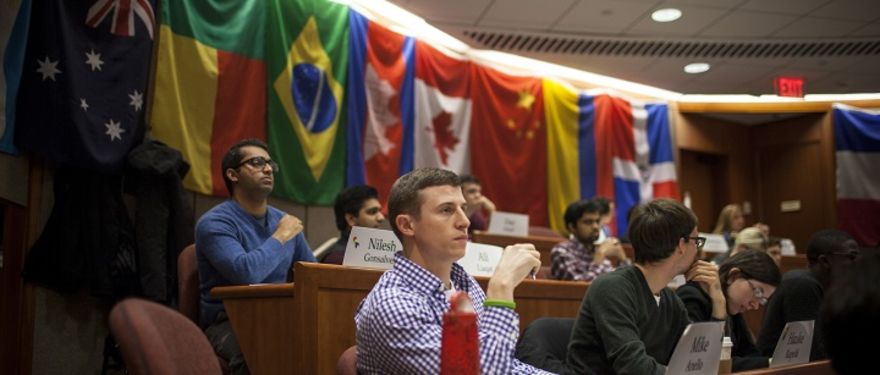The student body at HBS is incredibly diverse. 34% of the Class of 2017 is international (by citizenship), and over 64 countries are represented. While some international students plan to return to their home countries, many choose to stay in the United States for summer internships and full-time post-MBA work.
Whatever career path international students choose to pursue, the Career and Professional Development Office (CPD) at HBS is on hand to provide resources, guidance, and access to job opportunities.
Phillip Andrews, Associate Director of MBA Career and Professional Development, has been with CPD for the last four years. We checked in with him to learn more about what international students should know about the job search at HBS.
What would you like international prospective students to know about CPD?
CPD devotes significant time and resources to both the U.S. job search for international students and the global job search outside of the U.S. While we are based in Boston, we continually build our global network of organizations that would like to hire HBS MBAs, from a mid-market private equity firm in Singapore, to tech start-up in Dubai, or a retailer in Chile. Back on campus, many of our Career Coaches (we have more than 50) work 1-on-1 with international students to help them sharpen their career vision and navigate the job search.
Is it common for students to return home during their summer internship?
Over the last five years, roughly half of our first-year students have returned to their home country for their summer internship, while the other half accepted a summer experience elsewhere. In many cases, our MBA students are “career switchers” interested in making a shift to a new industry, function, or geography. This is true of both our students from the U.S. and those from other countries. This means that many students use their summer internship experience to explore a new industry, test out a new company, or get a feel for a new geography.
How do international students approach the job search?
Based on a given student’s unique career vision, they are going to utilize different approaches to the job search. At HBS, there are two primary types of searches. One, the “formal” recruiting process, involves interviewing with organizations that come to campus during our dedicated interview weeks (in October for second-year students and in late January for first-year students). The other approach is the “networked” search where a student connects with organizations that are eager to recruit HBS students but may not come to campus during the dedicated interview weeks. For example, students that are interested in consulting in London or a large U.S. technology firm would be more likely to participate in the dedicated interview process, while those looking for roles in health care in South Africa or retail in Brazil will utilize CPD’s career resources and contacts to conduct an effective networked search.
Do many international students choose to work in the U.S. after business school?
Yes, many do. In the Class of 2015, 66% of international students who sought a full-time position at graduation accepted a full-time job in the U.S.
Is it easier for international students to get work visas at larger companies?
The likelihood of H-1B visa sponsorship has very little to do with company size and is more closely tied to industry and/or a specific company’s policies. We have observed that smaller, earlier stage companies are increasingly willing to pursue visa sponsorship and the risks of the H-1B lottery. Perhaps this is because these firms are more comfortable with risk and understand the value of an international perspective.
How does the alumni network impact the job search for international students?
The HBS alumni network is vast and incredibly connected. I find that non-U.S. alumni working in the U.S. are often very eager to help students from their same home country or region with the U.S. job search, from networking to understanding career trajectory. Outside of the U.S., I see a similar level of alumni enthusiasm and willingness to help when an alum learns of a student interested in career opportunities in the alum’s country.
What visa options are available for students who wish to stay in the U.S.?
Non-U.S. students hold either a F-1 or J-1 visa and are eligible for U.S. work authorization after the first-year for a summer internship and immediately after graduation for 12 months (F-1) to 18 months (J-1) without requiring company sponsorship. Longer term U.S. work authorization is available through the H-1B visa which does require company sponsorship. CPD works closely with international students to educate them about the available options and how to approach U.S. companies. We also engage with U.S. employers to help them better understand business immigration and how to hire an international student.

